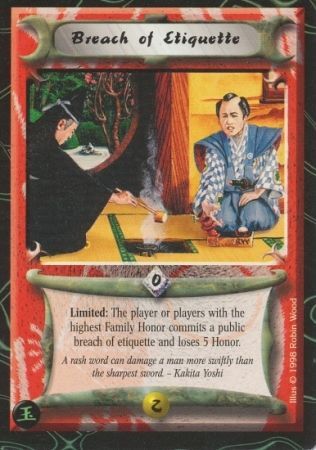Lots of cool design decisions that we already know about, but lots still unknown. Here are some things I am curious about, and irresponsible speculation that will likely be wrong:
Imperial Favor : We know it's in the game. Questions are, how do you get it, and what does it do.
My speculation : It works very similarly to the original favor. Once per turn, the player with the highest honor can bow a personality to take the imperial favor. It can be used to send home a personality from battle bowed, to rehonor a personality, or to draw a card. Further speculation: you can use the favor to honor a personality -- it can move a character up an 'honor level', from dishonored to normal, or from normal to honorable. I also wouldn't be surprised if the battle action is cut or altered -- maybe it can only send home small people or something.
Alternatively, maybe it is an effect that the highest honor player gets automatically at the beginning of the turn, but if that is the case, it might be toned down somewhat.
If this is right, then maybe the favor gives a built in mechanic that can let people crawl to honor wins: the player ahead in honor can lobby, use it to honor a personality that is out of fate, and gains their glory in honor at the end of the turn. Rinse and repeat. Of course, they can also gain by winning attacks using the ring of air, even if they can't break provinces.
Actions and Phases: From various card texts, attacking back and forth takes place during the conflict phase. I think that most actions that would have been limited, open, or battle in the CCG is likely to read: Action: During the conflict phase... Even control effects are likely going to be mostly used during the conflict phase. There will be no rules of presence or relevance. Instead, many effects will specify that they have to affect an attacking, defending, or participating character.
Why? Interactivity is a good design goal, and the existence of political conflicts and political strength (plus the fact that you can defend without risking annihilation) means that there is no structural thing that stops the most pacifistic phoenix or crane deck from defending at battles. Even more control type effects might need to be performed often by people at the conflict -- so maybe the equivalent of Shosuro Maru might exist, but it would read something like 'During a political battle, if Maru is participating, bow Maru: The opposing player must choose and bow a character.' I don't think there will be many effects that can be generically played outside the conflict phase to bow, dishonor, or kill other characters.
Victory Conditions: It's pretty clear that province breaking will be a win condition for most clans at least sometimes, and probably the main win condition for most clans. Will there be clans that don't typically win through breaking provinces? Let's make bold predictions by clan:
Crab: Only province breaking. Military focus.
Crane: 50-50 province breaking/honor wins. Has the tools to opportunistically dishonor win if the opponent makes risky bids. Court focus. Could be dedicated honor wins, but I doubt it -- their spoiled cards have a LOT of raw courtly strength, including an 0/3 for 1 and a +4 court strength attachment for 2.
Dragon: Mostly province breaking wins. Balanced focus. Can win by honor if opponent bids risky and the game stalls.
Lion: Mostly province breaking. Military only. Probably can be built to switch to an honor win if needed.
Phoenix: I am guessing this is the one clan that primarily wins by honor. Doesn't have great either military or court stats: wins by saving provinces with battle control effects until they hit 25.
Scorpion: I would like to see this as 50-50 province breaking/dishonor wins. Courtly focus, but more balanced than crane. Probably will be more like 75/25 province busting/dishonor, or even less if there aren't many actual dishonor tools (as opposed to control tools).
Unicorn: Province breaking, military focus. Someday there will be a battle maiden honor switch deck, but probably not in the base set.
